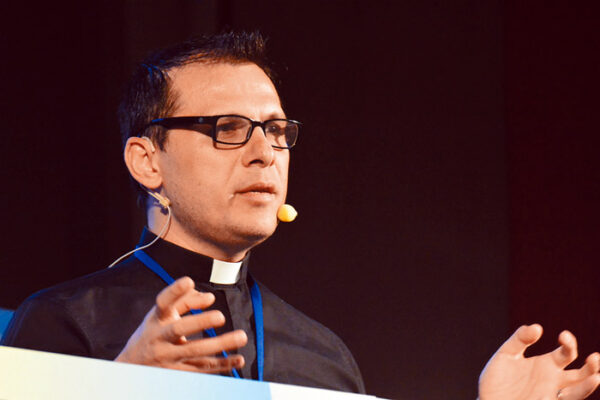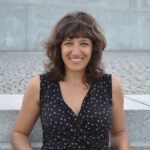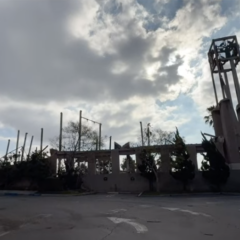This article was originally published by Religion Unplugged, with the support of CRCC’s global project on engaged spirituality.
BETHLEHEM— In the Evangelical Lutheran Christmas Church in Bethlehem, a stained glass window depicting a scene from the Gospel of Luke is marred by a bullet hole. It is a remnant from the Second Intifada, when Palestinian militants clashed with the Israeli army.
For 42-year-old Palestinian pastor Munther Isaac, the bullet hole inside his church is a symbol of the conflict he aspires to resolve. A Lutheran with an evangelical background, he is involved in the controversial and often slow work of exposing Christians abroad to the realities of the Israeli occupation.
Since 2012, Isaac has directed Christ at the Checkpoint — a conference hosted by Bethlehem Bible College, where Isaac is the academic dean — to challenge evangelical support for Israel’s policies in the Palestinian Territories.
In his work at the conference and beyond, Isaac pushes — sometimes provocatively — for no less than a theological shift in the evangelical world, one that replaces the end times vision of Jewish return to the land with a vision of peace in which the territory is shared by Jews, Christians and Muslims. The central question of his work is, Isaac says, “How can we redeem religion in terms of being part of the solution in Israel and Palestine?”
Today, Isaac’s work has never been more urgent — or complex. 2022 marks 55 years since the 1967 Six-Day War, when Israel captured East Jerusalem, the West Bank and Gaza — territories Palestinians claim for a future state. Yet decades of negotiations — amid Israel’s expanding settlement project and violence at the hands of the Israeli military and Palestinian militant groups — have failed to produce a two-state solution. U.S. evangelicals, meanwhile, have leaned heavily on the Israeli side, helping to motivate former President Donald Trump’s 2018 decision to move the U.S. embassy from Tel Aviv to Jerusalem, where Palestinians hope to build a capital.
Last May, an 11-day war between Israel and Hamas — the militant group that rules the Gaza Strip — underscored the immense challenges for the two populations to find lasting peace. But Isaac’s work to nudge that horizon into sight has been hampered by COVID-19. The 2020 Christ at the Checkpoint conference was reduced to a webinar; an attempt to reschedule for 2021 was similarly scuttled by the pandemic.
In spite of this, Isaac has vowed to continue his work and has a new book out about his life’s journey as a Palestinian Christian. In it, he writes movingly about the parable of the good Samaritan, who helps a dejected traveler when other men of faith leave him behind. Isaac uses the story, in which Jesus answers the question, “Who is my neighbor?” to argue for a more expansive definition of neighbor that incorporates the religious and political other — including Muslims and Jews. “Helping him cannot be a matter of choice,” he writes. “He is a neighbor.”
Yet in the Palestinian territories, the neighbor is also the occupier. Isaac, a 10th generation Palestinian Christian, grew up in the throes of the First Intifada, a largely nonviolent Palestinian uprising against Israeli military rule. At the time, Isaac’s hometown of Beit Sahour, outside Bethlehem, was a locus of civil disobedience, famous for its residents’ refusal to pay taxes to the Israeli authorities. Isaac remembers demonstrations, curfews and one episode in which soldiers confiscated the family’s car to make up for the lost revenues.
Amid the chaos, Isaac found an escape in religion. Raised an Orthodox Christian, at age 10 he joined an evangelical church founded by a U.S. Presbyterian mission. At the church and its affiliated summer camp, Isaac became devout and gained a reputation for memorizing Bible verses. One night, the campers were asked to throw a stick into a campfire, a gesture meant to symbolize their commitment to keeping the flame of faith alive. “I want to give my life to Christ,” Isaac remembers saying as he tossed the wood into the fire.
Back then, Isaac said, there was no “horizontal component” to his faith — meaning it did not extend outward into his political reality. But that began to change after he enrolled at Birzeit University, a Palestinian college buzzing with student activism. There, he listened to his peers debate the merits of different Palestinian factions and their tactics to bring about Palestinian liberation.
In his third year at Birzeit, the Second Intifada — a popular uprising that included suicide bombings against Israeli civilians — broke out, and Israel brought the full weight of its military to bear on the West Bank. Isaac remembered “walking through checkpoints and battling emotions of anger and hatred.”
“We must do something,” he thought to himself. “I have to do something.”
Soon, Isaac said, his purpose came into view. “I decided I want to study theology, and the reason was, I want to do something for my people.” At the urging of an American Christian he had met in the West Bank, Munther applied to the Westminster Theological Seminary in Pennsylvania; a U.S. philanthropist devoted to aiding Middle East Christians paid his way. Preparing for seminary as the Intifada raged, Isaac read books at the intersection of faith and politics. He was struck in particular by Naim Stifan Ateek’s “Justice and Only Justice,” which applies the concept of liberation theology — the idea that Christianity demands action on behalf of the oppressed — to the Palestinian cause.
“I began to realize that there are those who speak about these issues from a faith perspective,” Isaac said.
Meanwhile, having pledged to make his life in Palestine, he refused to date American women lest marriage keep him in the U.S.
●●●
After graduation from seminary, Isaac returned to the West Bank. Coming home proved an easy landing; he already had a job lined up as an instructor at Bethlehem Bible College. He is now married to a Palestinian architect, Rudaina Isaac, and they have two children. In addition to a deeper understanding of American Christians, his time in the U.S. left him with an appreciation of football — he still wakes up in the middle of the night to catch Eagles games.
Munther Isaac with his wife and two children. Photo courtesy of Isaac.
At the seminary, Isaac said, conversations rarely strayed from faith. The Bible college proved a contrast, as students and faculty spoke freely about the grim political conditions for Palestinians. One topic of conversation was Christian Zionism, the movement to support Jews in Israel based on the belief that the Bible promised the land to the Jewish people. Isaac credits his Bible college colleague, the prominent Palestinian reverend Alex Awad, with breaking a “taboo” among evangelicals to explain how Christian Zionism undermines Palestinian rights: “We have to speak on politics, and we can be critical of Israel as pastors, not just speak about going to heaven.”
In 2010, Awad initiated the Christ at the Checkpoint conference, and in 2012, Isaac took over as director. That year, he earned a standing ovation for his emotional speech asking if evangelicals had “lost (their) conscience.” Standing against a poster depicting Israel’s hulking concrete security barrier — a symbol of Israeli control over Palestinian lives — Isaac said he was “not calling for the destruction of the state of Israel” but rather equality between Israelis and Palestinians. “The Palestinian church must survive in Palestine,” he said.
From the get-go, the conference was controversial, especially the name. Isaac said that some critics accused the organizers of invoking the antisemitic trope that Jews were to blame for Jesus’ suffering. But the point was simply to get participants to picture Christ’s encounter with one facet of day-to-day life under Israeli occupation — what would he say to the Israeli soldiers at the checkpoint? To Palestinians crossing it?
“The idea is more a conversation between our faith and our reality,” Isaac said.
In the early years, the conference had a sizeable evangelical audience; some Christian Zionists even spoke at the conference, sparking debate. Gary Burge, faculty dean at the Calvin Theological Seminary in Michigan, who is on the conference’s international board, said that the conference has reached roughly 5,000 American evangelicals.
“These were evangelical leaders who returned home to tell what they heard and saw,” he said in an email. “This is why the conference drew such criticism within Israel and in the U.S. People recognized that it was making a difference.”
More recently, evangelical participation has waned — in part, Isaac said, because the Christian Zionist establishment has solidified against Christ at the Checkpoint. On its website, Christians United for Israel, the largest Israel-focused Christian advocacy group, accused the conference of attempting to “sway Evangelical Christian opinion against Israel.”
Even so, Isaac credits the conference with a shift among the evangelical rank and file.
“It is not an exaggeration to say that there was only one perspective relevant in the evangelical world, and we imposed ourselves so that now there is a conversation,” he said. “Even those who would not say, ‘OK, we have changed our theology’ would say they cannot ignore the Palestinian voice.”
Polling seems to bear this out, especially among the younger faithful: According to one 2021 tally, support for Israel among U.S. evangelicals ages 18 to 29 is at a surprisingly low 33%.
In recent years, Christ at the Checkpoint has sought to expand its reach beyond the U.S. and Palestine, with a plan to “draw in evangelical leaders around the world, not just the West,” said Burge. Part of Christ at the Checkpoint’s impact happens outside the conference hall, where participants inevitably witness Israeli soldiers, checkpoints and the concrete security barrier.
“I have always believed that books and conferences within the West have little effect on audiences,” said Burge. “However, if someone, particularly a Christian Zionist, simply gets on a plane and sees firsthand what the occupation does, they are changed. I have seen many people surprised at what they were not told.”
That’s why COVID-19 has proved such a conundrum; with international travel snarled by the pandemic, it’s harder to convey the severity of the occupation for Palestinian Christians when participants can’t see it firsthand.
“I really don’t know what can be done. We can’t travel, we can’t have people visit,” said Isaac. “Usually, when people ask me what is your strongest argument against Christian Zionism, I let the occupation speak for itself.”
Isaac said he is hesitant to embark on another virtual conference and will reassess the conference’s options in 2022.
But that doesn’t mean that Isaac’s work is diminished. Today, his efforts to help Palestinian Christians, whose numbers have shrunk in recent decades for economic and political reasons, are more direct. During the pandemic, his church provided solace and organized financial help for struggling parishioners. For now, Christ at the Checkpoint’s website carries a message that could be applied to Isaac’s ongoing work to recruit evangelicals to the struggle for Palestinian liberation: “Stay tuned.”
Click here to read the story on Religion Unplugged.
Naomi Zeveloff is a journalist fellow with the Spiritual Exemplars Project.







